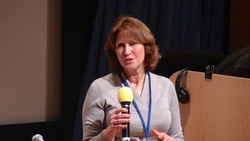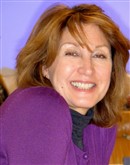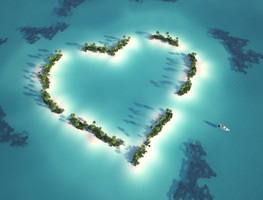 | | Poverty of the Heart | | Speaking at the UN Ingrid Stellmacher explores 'Poverty of the Heart' and launches the Dignity Diaries, as a tool to discover what dignity in toay's world really means.
More ...
|
 | | Ingrid's Insights | | Le Menach Foundation CEO, Ingrid Stellmacher, unravels complex issues and gets to the heart of conflict resolution issues.
More ...
|
| | |
|
World heart Day

As today is World Heart Day I want to talk about the heart. But not the one promoted globally by the World Health Organisation and the United Nations, to raise awareness of how not looking after it has become the No 1 killer in the West. Or the one that without proper nutrition in children, inhibits its ability to develop and function effectively against infection or disease, like Malaria or malnutrition; the No 1 child killer’s outside the West.
I want to talk about the other one: the heart that has no physical location. That unlike its counterpart embedded in our chest and without which life cannot go on, is without fixed location, and without which, feels life is not worth going on. So I will speak from my own heart. My compass for over 50 years so often ill read by me, much less listened to at times, but which I believe the care and wellbeing of in us all, to be of equal importance and more than worthy of a global day of recognition.
For so long designated as a place of weakness rather than strength, dictated by emotion rather than logic so considered less reliable. The existence of this ‘other’ heart, which cannot be touched or quantified is marginalised in government while idealised in story, poetry and song. And because the language of the heart speaks in actions not words, is harder to hear, get quotes on, and underestimated in business, politics and the exercise of power. Most of all I suspect it is because the most powerful, uncontrollable and unquantifiable commodity of all is said to reside there, and of course the most complicated and desired. Love.
That word ‘heart’, in this other context, like the words ‘peace’ and ‘love’ are what advertising agencies call ‘big’ words; meaning different things to different people and that’s the trouble. It’s difficult to define because to do so immediately confines its power and its meaning. The heart is full of feeling and emotion. Learning to understand our own, let alone anyone else’s, is a lifetime’s work. Learning to understanding the feelings of another culture may take longer still but making efforts to understand it is an absolute necessity. As Pakistan’s declared ‘Day of Love’ last week, in honour of the Prophet Mohammed (PBUH) as a man of peace is testimony to just how complex the language of the heart truly is and how dangerous it can be when ignored.
Emotions matter. They are the new rulers of the 21st Century as uprising after uprising around the world has shown, creating a new emotional map and new vistas. Making history and culture compulsory, not only in international relational programmes but schools and colleges around the world, is imperative if we are to navigate this terrain with some success. When one extremist voice speaks to another, the hidden language behind what is said is equally important to hear as the voice in the middle that gets drowned out or caught in the crossfire.
And my own heart wondered what the Prophet Mohammed, (PBUH), would think of the death, destruction and division unleashed and acted out in his name. I wish I could sit with him and ask him. The same way I wonder what Jesus would make of the fights between Greek and Armenian clergy that break out with regularity at the Church of the Holy Sepulchre in Jerusalem.
Some years ago I was invited to do a conflict resolution workshop with a group from Pakistan. As I stood at the front of the room and the men only class sat waiting for me to start, an elderly gentleman rose to his feet. The harshness of his life etched so deeply on the contours of his face it resembled the surface of a well weathered tree trunk. Shouting at me and waving his arms he began blaming me for every misdeed done during the reighn of the British Empire and everything they might do in the future. No one intervened or asked him to sit down and I suspected they wanted to see what this lone British woman was made of.
He continued shouting in his broken English, made all the more incomprehensible by his lack of teeth. I shouldn’t be here! I am a woman! I am a mother! I should go home! He continued ranting for several minutes more before people fed up with the sound of his voice and realising I was showing no signs of weakness or going away, asked him to sit down – which he didn’t. So I took a breath, a step, and spoke from the heart, and asked him, “Has your anger hurt you enough?”
Silence settled on him and the class so quickly you could hear a pin drop. The energy in the room changed immediately. I looked him in the eyes and asked him again. “Has your anger hurt you enough?” In that moment if my heart had burst though my chest and fallen to the floor I would not have been in the least bit surprised it was beating so hard, and thankfully audible only to me. My gaze held his as it does when you really look at someone. When you really see them, and your eyes meet their's in that place where there’s nowhere to hide. We stayed there for what seemed an age but was only seconds as I took a step closer and asked him, quietly this time, “Has your anger hurt you enough?”
The silence grew louder. He didn’t cry and the tears that filled his eyes didn’t spill over or roll down his face. He held back with a dignity that everyone shared, and instead, slowly and silently, he simply sat down. I knew he had just made the longest journey of all. The one from his head to his heart and he had taken the whole class with him in a nano second.
It wasn’t me he was shouting at or me he was angry at. It was his situation. His ‘government’s inability to govern’ he later told me. The lack of equality, safety, healthcare, electricity, iniquities and history that made everyone in that room the walking wounded. He ranted at me because I was from the ‘West’. He ranted at me for all the times he wasn’t heard by the people he felt should have listened. He ranted at me because he was in pain, he ranted at me for everyone’s pain ignored. He ranted at me because I was there. He ranted at me because he could.
Turns out the old man who was only 49 years-old and had educated over 400 girls in Sindh and Balochistan. He was a one man NGO affiliated to the United Nations and dedicated his life to improving the lives of young women and girls. I knew the huge efforts and sacrifices he must have made to do this and I was humbled. He humbled me further at the end of the day, by making me a gift of a book he carried with him about a Sufi saint because he was grateful I had come. And when he smiled through the few decaying teeth still left in his head, we met in that place again for the briefest of moments, where there’s nowhere to hide, before he turned and walked away. It requires courage to go there, for we are vulnerable, open and honest as nowhere else. And once you leave it, it can be a long road back.
We cannot escape the calamity and complexity of the world breaking and recreating around us daily. It makes the singularity of fundamentalist and extremist ideologies so attractive because it swaps confusion for the clarity of messages that are simple to understand. Compressing complex information into slogans and sound bites, distorted and distilled, is as dangerous as it is deadly. The language of the heart, the mysterious place it resides and its strength cannot be dismissed as it lies in us all. To dismiss it is to dismiss humanity and as bad as things are, we are not there yet.
|
Ingrid Stellmacher, 29/09/2012
|
| |
|
Indra Adnan (Guest) |
09/03/2012 10:40 |
Ingrid - that's so spot on, thanks for your insights. I'm fascinated too by the clarity of the UN's recognition of distinct qualities in women which they are now asking others to invest in. In some ways, the over-developed West is behind with this thinking, with women themselves over focussed on gender neutrality. Imagine women politicians in the UK claiming that empowering women would change the whole of society?
|
|
|
|
| |
|